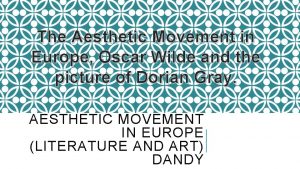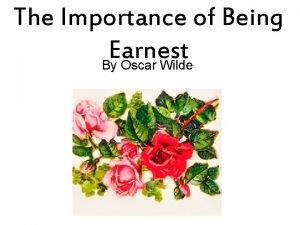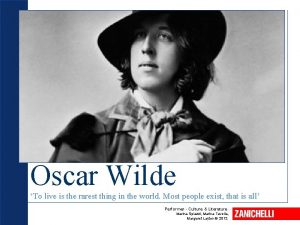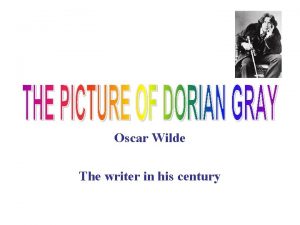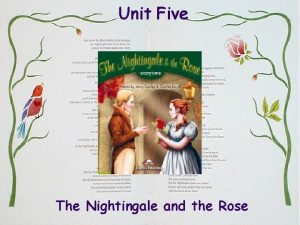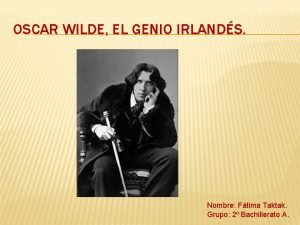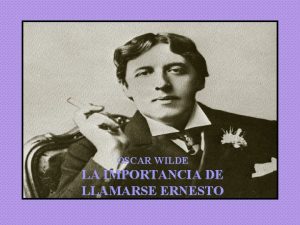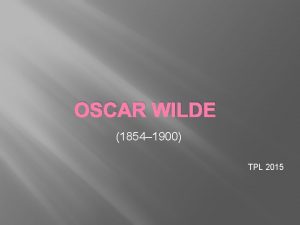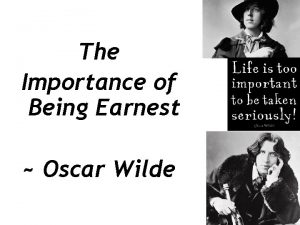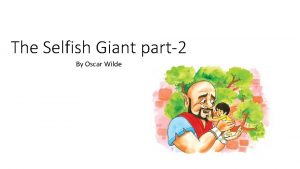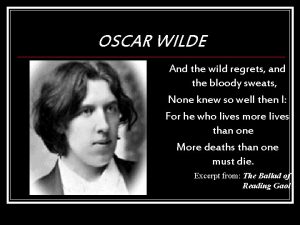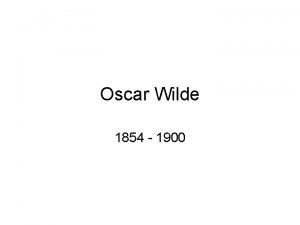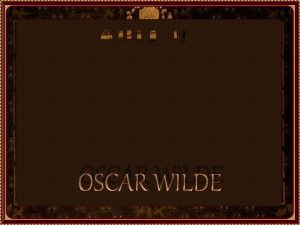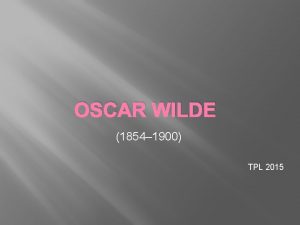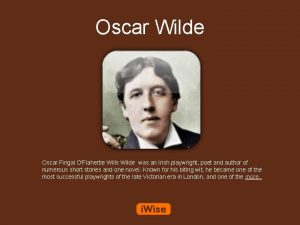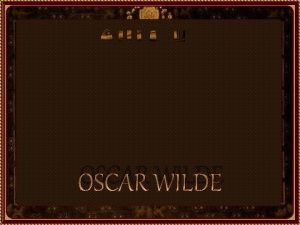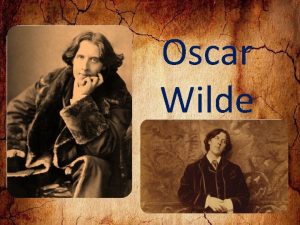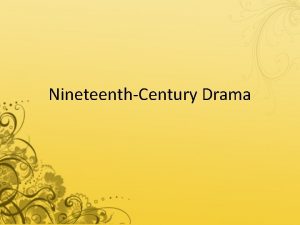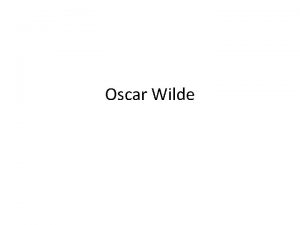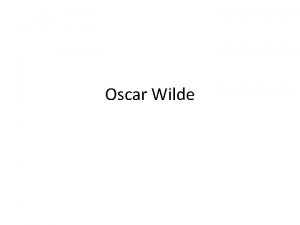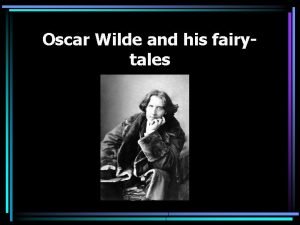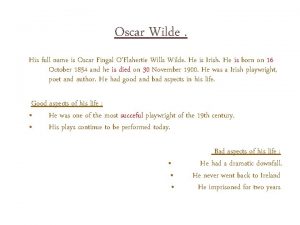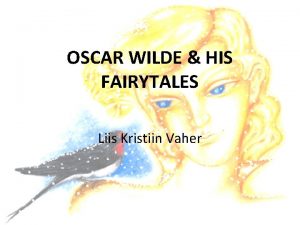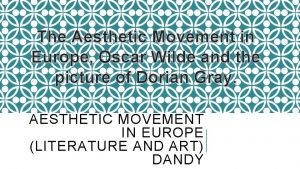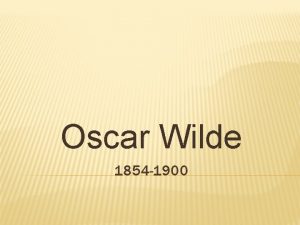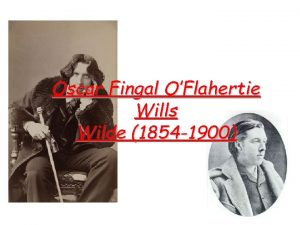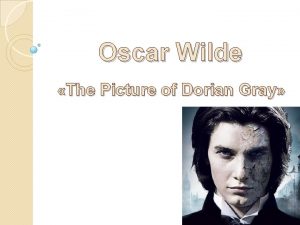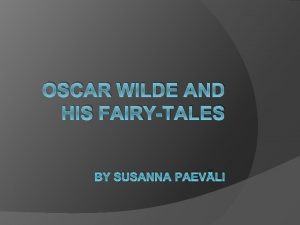Oscar Wilde The writer in his century Aesthetic








































- Slides: 40

Oscar Wilde The writer in his century

Aesthetic Movement in Europe How did the Aesthetic literary and artistic movement influence Oscar Wilde’s life and Dorian ‘s life? Are there points in common? Oscar Wilde preached aestheticism and wanted to construct his life like an art work, without obeying to any other criterions except pleasure and beauty instead Dorian breaks the common moral laws and doesn't hesitate in front of vice and crime, outside he was like an art work, but inside he had negative vices like drugs, sex and murder.

What is the PREFACE to The Picture of Dorian Gray about? What does it tell us about art? The artist is the creator of beautiful things. To reveal art and conceal the artist is art's aim. The critic is he who can translate into another manner or a new material his impression of beautiful things. The highest as the lowest form of criticism is a mode of autobiography. Those who find ugly meanings in beautiful things are corrupt without being charming. This is a fault. Those who find beautiful meanings in beautiful things are the cultivated. For these there is hope. They are the elect to whom beautiful things mean only beauty. There is no such thing as a moral or an immoral book. Books are well written, or badly written. That is all. The nineteenth century dislike of realism is the rage of Caliban seeing his own face in a glass. The nineteenth century dislike of romanticism is the rage of Caliban not seeing his own face in a glass. The moral life of man forms part of the subject matter of the artist, but the morality of art consists in the perfect use of an imperfect medium. No artist desires to prove anything. Even things that are true can be proved. No artist has ethical sympathies.

An ethical sympathy in an artist is an unpardonable mannerism of style. No artist is ever morbid. The artist can express everything. Thought and language are to the artist instruments of an art. Vice and virtue are to the artist materials for an art. From the point of view of form, the type of all the arts is the art of the musician. From the point of view of feeling, the actor's craft is the type. All art is at once surface and symbol. Those who go beneath the surface do so at their peril. Those who read the symbol do so at their peril. It is the spectator, and not life, that art really mirrors. Diversity of opinion about a work of art shows that the work is new, complex, and vital. When critics disagree, the artist is in accord with himself. We can forgive a man for making a useful thing as long as he does not admire it. The only excuse for making a useless thing is that one admires it intensely. All art is quite useless because its aim is simply to create a mood. It is not meant to instruct. The Preface is a series of epigrams, or concise, witty sayings, that express the major points of Oscar Wilde’s aesthetic philosophy. In short, the epigrams praise beauty and repudiate the notion that art serves a moral purpose.

• The preface offers one of Wilde's most famous aphorisms: "There is no such thing as a moral or an immoral book. Books are well written, or badly written. That is all. " According to Wilde, the artist might consider the moral or immoral lives of people as part of the subject matter of a work, but art itself is not meant to instruct the reader. The true artist is not out to prove anything and makes no judgments of right or wrong. What people call "vices" or "virtues" are merely materials for the artist. Those who attempt to go beneath the surface of a work, or to read meaning into a symbol, do so at their own risk. Considerable disagreement about a work of art only proves that the work is "new, complex, and vital. " • Wilde concludes the preface by saying that it is fine to create something useful so long as it is not admired as art. The only reason for creating something useless is to admire it a great deal. Thus, "All art is quite useless. " That is, it exists for its own sake as art ("art for art's sake") and not for some moral purpose. • The preface sets the tone for the book and lets the reader know that The Picture of Dorian Gray will be a book of expansive ideas and wonderful language.

A 'DANDY' Oscar Wilde was considered a 'dandy', a very elegant man who gave great importance to his appearance, refined and eccentric lifestyle and brilliant conversation.

DIFFERENCES BETWEEN THE AESTHETIC MOVEMENT IN FRANCE, GB. • . The Aesthetic Movement is a European 19 th century movement that emphasized aesthetic values over moral or social themes in literature, fine art , the decorative arts, and interior design. Generally speaking, it represents the same tendencies that symbolism or decadence stood for in France, or and may be considered the British branch of the same movement. It belongs to the anti-Victorian reaction and had post-Romantic roots, and as such anticipates modernism. It took place in the late Victorian period from around 1868 to 1901, and is generally considered to have ended with the trial of Oscar Wilde (which occurred in 1895).

Aestheticism was inspired by the principle of 'art for art's sake (art for the love for art). . . it had to simply create beauty. The Aesthete believed that Form was the essence of Beauty and Beauty was the highest perfection of human endeavours. The Aesthetic writers broke away from the confining conventions of their time and led very unconventional lives, pursuing pleasure and new sensations and devoting themselves to the cult of beauty and art. Symbolists believed that art should aim to capture more absolute truths which could only be accessed by indirect methods. Thus, they wrote in a highly metaphorical and suggestive manner, endowing particular images or objects with symbolic meaning. Symbolism was hostile to "plain meanings, declamations, false sentimentality and matter-of-fact description", and that its goal instead was to "clothe (present) the Ideal in a perceptible form" whose "goal was not in itself, but whose sole purpose was to express the Ideal".

The Conflict Between Aestheticism and Morality in Oscar Wilde’s The Picture of Dorian Gray PATRICK DUGGAN • Oscar Wilde prefaces his novel The Picture of Dorian Gray with a reflection on art, the artist, and the utility of both. After careful scrutiny, he concludes: “All art is quite useless” (Wilde 4). In this one sentence, Wilde encapsulates the complete principles of the Aesthetic Movement popular in Victorian England. That is to say, real art takes no part in molding the social or moral identities of society, nor should it. Art should be beautiful and pleasure its observer, but to imply further reaching influence would be a mistake.

It would be a mistake, however, to interpret the novel as a patent recommendation of aestheticism. To the aesthete, there is no distinction between moral and immoral acts, only between those that increase or decrease one’s happiness; yet, Dorian Gray refutes this idea, presenting a strong case for the inherent immorality of purely aesthetic lives. Dorian Gray personifies the aesthetic lifestyle in action, pursuing personal gratification with abandon. Yet, while he enjoys these indulgences, his behavior ultimately kills him and others, and he dies unhappier than ever. Rather than an advocate for pure aes theticism, then, Dorian Gray is a cautionary tale in which Wilde illustrates the dangers of the aesthetic philosophy when not practiced with prudence. Aestheticism, argues Wilde, too often aligns itself with immorality, result ing in a precarious philosophy that must be practiced deliberately.

• The ruination of Dorian Gray, the embodiment of unbridled aestheticism, illustrates the immorality of such a lifestyle and gravely demonstrates its consequences. Wilde uses Dorian Gray not as an advertisement for aestheticism, but rather, he uses Dorian’s life to warn against aestheticism’s hostility toward morality when uncontrolled. Wilde himself admits, in a letter to the St. James’s Gazette, that Dorian Gray “is a story with a moral. And the moral is this: All excess, as well as all renun ciation, brings its own punishment” (Wilde 248).

• The character of Dorian Gray and the story of his profound degen eration provide a case study examining the viability of purely aesthetic lives • Dorian’s relationship with the actress Sibyl Vane plainly illustrates this marked change in personality. Dorian pursues Sibyl from first sights, intent on acquiring her before he ever attempts to truly know her. Indeed, Dorian’s love for Sibyl is overtly superficial, as evidenced by Dorian’s own description of his infatuation with Sibyl: “I loved you because you were marvelous, because you had genius and intellect, because you realized the dreams of great poets and gave shape and substance to the shadows of art” (Wilde 101). Dorian is not attracted to Sibyl’s character of personal ity, but rather acting talent and enthralling performances; this is what enchants the aesthetically inclined Dorian. When Sibyl leaves the stage, then, she no longer serves a purpose in Dorian’s aesthetic life, and thus, Dorian abandons her unceremoniously. Dorian does not regret informing Sybil that, “Without your art, you are nothing” (Wilde 101). The tragedy of Sybil’s later suicide, brought about by utter despair at her desertion, is lost on Dorian, who instead enjoys the dramatic intrigue of the occa sion. For Dorian, whose uncontrolled aestheticism rejects the concept of morality, the immorality of his actions goes unrecognized. In fact, Dorian declares excitedly, “It seems to me to be simply like a wonderful ending to a wonderful play. It has all the terrible beauty of a Greek tragedy, a trag edy in which I took a great part, but by which I have not been wounded” (Wilde 114).

Dorian reveals his epiphany to Lord Henry: “The soul is a terrible reality. It can be bought, and sold, and bartered away. It can be poisoned or made perfect. There is a soul in each one of us. I know it” (Wilde 211). Unfortunately for Dorian, this realization comes too late to save his soul from its degradation, long nurtured by a purely aesthetic life, and he is destroyed. The realization itself, however, is indicative of Wilde’s argument woven throughout Dorian Gray. Despite Wilde’s publicly advocating the principles of aestheticism, Dorian’s demise illustrates Wilde’s recognition that aestheticism needs to be properly controlled. While the pursuit of beauty and happiness in life is always Wilde’s ideal, he also implies that the consequences of one’s actions must be thought out and the impact of one’s decisions, beyond oneself, must also be carefully considered before acting on any impulse.

Oscar Wilde’s London /living and working in Victorian London • What was the city like? (Environment, Housing, Pollution) City of contradictions slums and suburbs • Where did people live and work? Which classes? Opportunities for lower classes and unemployed. • Education workhouses • Exploitation of unskilled workers, women and children. Class structure poor law : Victorian values Self help

• Oscar Wilde’s London /living and working in Victorian London THE VICTORIAN AGE Victorian society is like a theatre. Outside, the streets smell of horse manure and the air is full of soot, while inside, the society is rigidly stratified: the queen and aristocracy sit in sumptuous comfort in the royal box, the upper classes next to them. In the dress circle and front stalls are the solid middle classes, while the lower middle classes of aspiring clerks and traders sit at the back of the stalls or second circle. To complete the segregation, the working class, who enter by a separate entrance, sit in the gallery and have the worst view of the show. In the 1850, London was developing its business, by building new industries, new docks along the River Thames, new railways, streets and buildings but, at the same time, it was destroying the same city. In fact, the new industries used to run with coal as combustible, and it upgraded the level of pollution. The smog blackened the houses and the lungs of the people causing a lot of disease. Rich people did not have this problem. They were used to solving it by taking holidays in the countryside, far away from the smog and the illness of industrial London, but the problem was unsolvable for poor people. They could not leave the city, because of their work, so they had to live in a city where the air was black, and as they had no money, they had to live in very small houses in cramped streets, in the suburbs of the city. These homes would share toilet facilities and there were always smell of manure. Disease as cholera and typhoid was spread through contaminated water supply, causing a large amount of deaths.

• Oscar Wilde’s London /living and working in Victorian London SOCIAL CLASSES • The aristocracy In the 19 th century the aristocracy had an amazing power and was reinforced by the new aristocrats who owed their success to commerce, industry, and the professions. The aristocrats also head Britain's social life. On their country estates, they go hunting, shooting and fishing. • The middle class was a fairly small group of professionals, factory owners, businessmen, merchants and bankers. In those years it expanded very rapidly and split into two different groups: • The upper middle class which was divided between professionals (doctors, lawyers) and industrialists • The lower middle class (professional managers). As government passed more and more laws, civil servants – working in both central and local government – multiplied. London became a city full of clerks.

• The working class This class was composed by men and women who performed physical labour, paid daily or weekly wages. These were the people who benefited most from the booming Victorian economy – their wages rose. • The lowest class The 'lowest class' comprised about a quarter of urban populations. People were in deep poverty and living in squalid, even deadly slum conditions. Some of these people were unemployed, some were criminals, all lived a precarious existence. Rural poverty was even worse. Child labour and poverty were common. Women were forced to give their children opium so they wouldn't make any noise while their mothers were in the fields. When times were bad and work ran out, these people had no choice. They had to leave the land migrate to the booming cities or starve. By 1901, the number of men working on farms has dropped by a third

Victorian society did not recognize that there was a lower class. The prevailing attitude was that the poor deserved the way they lived. If good moral choices had been made, the poor wouldn't be living the way they did. 'Their life was the life of savages. ' Many ended up in the workhouse (institutions where homeless poor were lodged, but the living was horrendous and it was almost better to be back on the street).

POVERTY 19 th century Britain saw a huge population increase stimulated by the Industrial revolution. The industries developed rapidly and demanded a lot of workers to produce even more goods to put into the growing world market. For this reason, lots of people that lived in the countryside and were dependent on agriculture, migrated to London. They thought that the city offered a possibility to work and change their life conditions. But when they arrived, they found a horrible background: they were obliged to live packed up in dirty slums and to work long hours in unhealthy places. They were even poorer than before. The lowest class was about a quarter of urban population. The unemployed people were criminals and others died of starvation. Lots of unskilled people died in factories, crushed by machineries. Many men got drunk in the pubs for desperation. The majority of the population was employed in mining and steel industry. The poorer classes had no rights. They had to work 60 hours per week on average, without any Sundays or holidays. They earned practically nothing, but if they stopped, they were dismissed. All the family had to work to survive, even women and children, who began to work at the age of 3 or 5.

They were employed as chimney sweeps errand boys, crossing sweepers, shoe blacks, selling matches, flowers, and other cheap goods, or, if they were lucky, as domestic servants. In 1840 only about 20 percent of the children in London had no schooling. Charles Dickens, for example, worked at the age of 12 in a blacking factory. Instead, prostitution offered a “good earning”, in fact many prostitutes were independent women, they were aged between 15 and 22. They visited pubs, which were off limits for respectable women. They were so numerous that in the 19 th century there was 1 prostitute for 12 men. But with the rise in prostitution, there was an increase in sexual diseases, as syphilis. A typical Victorian double standard is that although there is no attempt to penalise men for having sex with prostitutes, women who sell sex are seen as sinful.

Social and economic Victorian values Help self is the idea that everyone has to create his own success with his work and means and he is responsible of that. The attainment of success is all based on the good will. Free trade stimulated economic growth. Economic growth created more jobs. More jobs meant more money for people to consume, which in turn meant new market opportunities for producers and traders. It is also demonstrated the fragility of this virtuous circle, in fact the situation became worse. Without state intervention it was clear that the whole Victorian economic miracle might be undermined. The solution adopted was central government intervention to mitigate the most damaging effects of unrestrained industrial capitalism. Parliament voted the first grant to support education for the poor. Parliament had passed the first Factory Act. Employment of very young children in textile factories was forbidden, and that of adolescents restricted. Children had two hours a day for studying. Factory legislation was progressively extended to other branches of industry. Compulsory elementary education and the opportunity for almost all children to receive free elementary education without payment of any fees

Class and Women (rights/ duties and value of women in Victorian Britain ) class distinctions • Rights duties and Value of women , even according to class • How did women live, dress , get an education and job ? • Morality and Hypocrisy and double standards. • Why are women absent from the story; what role do Dorian’s mother/ Sybil / Lord Henry’s wife have?

• Class and Women (rights/ duties and value of women in Victorian Britain ) class distinctions MORALITY AND HYPOCRISY AND DOUBLE STANDARDS From our liberated point of view it is not easy to understand the women’s role in the Victorian era. The women were looked as second class persons. They have fewer legal rights than men, and almost no political rights – in particular, they're not allowed to vote. A married woman is the property of her husband, and her possessions – even her children – belong to him. The idea of respectable woman was woman as the “angel of the house” that had to stay at home looking after the children and taking care of the house. Only the job of a teacher was acceptable and the women from lower classes were able to work in textile factories. Moreover women were seen as the daughter of Eve, so the idea says that women are innately prone to corruption, and Victorian society makes a rigid separation between pure angels and immoral women. The Victorian age introduces also a double sexual standard; repressive rules for women's sexuality with sexual freedom for men. This feature of "moral values" only served to increase prostitution, and to increase venereal disease. Indeed the church, in order to save the purity of the housewife the Angel of the House sponsored prostitution. Women, whose sexuality was disavowed, were considered ill and hysterical.

WHY ARE WOMEN ABSENT FROM THE STORY; WHAT ROLE DO SYBIL/ LORD HENRY’S WIFE HAVE? • In Oscar Wilde’s famous novel “The Picture of Dorian Gray” women are objects, a “decorative sex” as Lord Henry said, and don’t have an important role in the story. • Men have relationships with women in the novel—Dorian falls in love with Sibyl and Lord Henry is married—but in the novel, relationships with women are superficial and short. Lady Wotton, like most of the women in the novel, is depicted with no real importance: she is briefly introduced, and never heard again after the dialogue with Dorian. The most important female character in the novel is Sibyl. There is little substance to Sibyl’s character: she is only very beautiful and very good in acting, and these features confirm what Lord Henry thinks: “women are a decorative sex”.

• WOMEN’S LIFE IN THE VICTORIAN ERA Women in Victorian era were seen as temples of love and purity, innocent creatures who need protection and so, could not be used for physical exertion or pleasurable sex. The only role of women, who were named the “angels of the house” after a poem of Coventry Patmore, was to get married and look after the homely work. The young ladies were groomed thoroughly to get married and had to be innocent, virtuous, biddable and dutiful. They ran the house, made meals for their husbands and children, made clothes for everyone, and grew everything that the family ate. The women werealso supposed to take care of someone who was sick (even mental illness and alcoholism)

The women were also responsible for sewing, knitting and painting the clothes. The gentlewomen made sure that the home was a place of solace and comfort for the husband children, free from all the hassles or burdens of outside work. They wear bodices that completely cover their bosoms and arms, and their skirts reach down to their ankles. Accessories like hats, gloves, umbrellas and fans, were used when a mother and daughter wanted to impress society. Another myth of Victorian womanhood is that of the 'fallen woman'. Based on traditional Christian notions of woman as the daughter of Eve, the idea of the 'fallen woman' says that women are innately prone to corruption. But, in an age when contraception is still primitive, giving birth is hazardous – many women die in childbirth or soon after.

• WOMEN’S CLASS : JOB AND EDUCATION The young women were mainly educated in accomplishments like French, drawing, painting, singing, dancing - everything which helped them to get a perfect impression (even if dancing was a pastime among most of the upper -class women and men). In the later part of Victoria's reign, many middleclass women seek activities and careers outside the home. But while it's easy enough to work in local charities, churches and the arts, especially music, it's harder for them to receive higher education and break into the professions. In the 19 th century, London University is unique in allowing women to take degrees. At Oxford and Cambridge, new colleges for women are founded but they aren't allowed to receive degrees yet: in fact women who want to become doctors had to go abroad. But where great industries are located, there are more jobs for factory workers than for domestic servants. The largest sector is textiles. Other industries requiring female labour include the manufacture of metal, chemicals, stationery and books. Many women also work part-time, doing sewing and washing and hawking goods in the streets. Other women work in nursing and run hotels – the professions remain dominated by men.

• WOMEN’S RIGHTS Victorian women are second class citizens. They have fewer legal rights than men, and almost no political rights – in particular, they're not allowed to vote. By law, a married woman is the property of her husband, and her possessions – even her children – belong to him. Influenced by the Bible, many people believe that men and women are born to fulfill different roles: men to command women to obey men and raise their children. Conceptions of women's passive sexual nature, added to ideas about possessive patriarchal individualism, equal male dominance. Any sexual transgression in polite society is severely policed. No matter how great the provocation, simply by leaving her husband a woman quits respectable society and becomes an outcast, especially because when they were considered 'fallen women', a prostitute, automatically they lost the respect of the other and of their family and they will not find a husband. This system gives middle class men plenty of opportunity to indulge in hypocrisy and double standards. It is seen as natural for gentlemen to use prostitutes but unnatural for women to have affairs.

Vice and Virtue ( Sex –drugs –crime) Victorian Hypocrisy • Explain Dorian’s fall into crime and perversion. Was it typical, Why was it so easy for him? • Double Standards / Victorian Hypocrisy • Wilde’s vices and virtues his fall to disgrace

• OSCAR WILDE’S VICES AND VIRTUES After a long time passed writing, moving to different parts of the world and being successful he definitively established in London. From this moment he started mixing in high society, sparkling at parties and spending much of his time with friends and lovers, often stepping beyond the bounds of what was considered morally and socially proper for the time. In 1891 Wilde met an English poet called Lord Alfred Douglas, son of John Douglas, 9 t h Marquess of Queensberry. It was the beginning of a tumultuous relationship that would cause many problems to Oscar. Alfred had a tempestuous relationship with his father which did not help matters. He disapproved of his son's lifestyle and when he learned about his openly living with Wilde, he set out to defame Wilde. For the opening performance of “The Importance of Being Earnest” in 1895 at St. James' Theatre in London, the Marquess planned to publicly expose and humiliate Wilde. Oscar took legal steps to protect himself against the 'brute' but he ultimately won a case whereby Wilde was charged with "gross indecency" for homosexual acts. The outcome of the sensational trial was a sentence of two years hard labour. After Wilde was imprisoned Constance had her sons' last names changed to Holland.

• DORIAN’S PERVERSION AND CRIMES In a period as the Victorian age where crimes, prostitution, drugs and homosexuality were illegal, but very common and typical, the majority of high society’s member conduced a strange kind of life based on pleasure and evasion from the reality. These people lived every day in hypocrisy. This was one of the reason of why the character of Dorian fell into crime and perversion and why it was so easy for him to do such terrible things. The second reason could be that he never had a real childhood as everyone; his mother and his father died when he was very young and he grew up with his grandfather that had never accepted and loved him. We can say that Dorian’s character had never known what love is. When he meets Lord Henry and he wishes that the portrait will grow older and that he will remain young forever he falls into another world characterized by a double identity and he begins to indulge in every kind of pleasure, moral and immoral. From the perversion and paedophilia with young boy and wives to the abuse of drugs and the murder of his best friend Basil.

Double standards / Victorian Hypocrisy • What does “morality” mean? Morality means a group of principles concerning right and wrong or good and bad behaviours. In its descriptive use morals are principally created by society, philosophy, religion, and/or individual conscience.

• And what did it mean in the Victorian Age? It can describe any set of values that espouses sexual restraint, low tolerance of crime, and a strong social ethic. Due to the prominence of the British Empire, many of these values were spread across the world. The morality and values of the Victorians can be classified under Religion, Morality, Elitism, Industrialism and Improvement. But, nowadays, historians regard the Victorian era as a time of many contradictions. An excess of social movements concerned with morals co existed with a class system that permitted hard living conditions for many. The apparent contradiction between the custom of an outward appearance of dignity and restraint, and the prevalence of social phenomena that included prostitution and child labour, were two sides of the same coin: various social reform movements and high principles come forth to improve the harsh conditions. In that period morality was strictly connected with hypocrisy.

• With the term Hypocrisy, we think about the act of pretending to have beliefs, opinions, virtues, feelings, qualities, or standards that one does not actually have. In fact, it is thus a kind of lie. Hypocrisy may come from a desire to hide from others actual motives or feelings. In the Victorian age people had to always show the best part of their life. They must be perfect at the facade just to be accepted by the society, in this way they were stereotyped as perfect characters. Homosexuality, prostitution, drugs, blackmailing were considered immoral and scandalous in that period. However, middle high class people used to create two different personalities, one moral and for this reason accepted by the society, and the another one, immoral anddisclaimed. For example, even Dorian Gray had two different personalities. He was really handsome and fascinating aesthetically, he symbolized the perfect gentleman. But he was hypocritical; he was used to taking drugs, having homosexual relationships, going with prostitutes and committing murders.

Faust / doppelganger ( living a double life) • Summary of Goethe’s Faust Johann Wofgang von Goethe’s Faust is a tragic play and it should be defined a tragicomedy. It was published in two parts: The First Part of the Tragedy and The Second Part of the Tragedy. It is Goethe’s most famous work and considered by many one of the greatest works of German literature. In the first part Mephistopheles (devil) makes a bet with God: he can help Faust in this desire to learneverything that can be known. The devil pursues Faust and they make an arrangement: the devil will serve Faust during his life and Faust will do everything the devil wants in hell after his life. Faust signs a contract with the devil with his blood. After some travels Faust meets Gretchen and he falls in love with her. With the help of the devil Faust sleeps with Gretchen and she discovers to be pregnant. Gretchen’s brother challenges Faust and he dies. Gretchen drowns her child and so she is convicted of the murder. Faust and the devil try to free her but they cannot do it. • In the second part Faust wakes in a fairies field and he starts a new cycle of adventure. At the end he goes in heaven and he loses half of his bet.

• Summary of Marlowe’s Faust The Tragical History of Doctor Faustus, normally known simply as Doctor Faustus, is a play by Christopher Marlowe, based on the Faust story, in which a man sells his soul to the devil for power and knowledge. One theme in Doctor Faustus is sin. Throughout the play, Faustus is continuously making wrong choices when it come. S to his lifestyle. His first sin was greed. Faustus began his downfall by making a pact with the devil. Doctor Faustus is a German scholar who is well known for his accomplishments and he wants to know everything possible. Faustus gives his soul to the devil in return for 24 years of servitude. At the end of his 24 years of servitude he was worried about what he had done. • The next morning some people discover him torn limb from limb and his soul was with the devil. • The difference between Dorian Gray and Faust is that Faust wanted knowledge in return for his soul and he has a medieval mentality, while Dorian wanted beauty and eternal youth.

Alter ego The Latin word “Alter ego” means “the other me”, an other way to be of the man. The famous story of Dr. Jekyll, a kind and nice doctor oppressed by his alter ego (Mr. Hyde), is an example of double personality. When he tells his story, he doesn’t hide his double life: a respectable appearance, that hides his frenetic desires. From this double personality he wants to find out a scientific method that could divide the good part of him from the bed one. With this notion he will live his double life without limits. • The fight between Jekyll and Hyde is an example of the “Victorian compromise”: people thought that the important thing was appearance.

Although the two stories (The Strange Case of Doctor Jekyll and Mr. Hyde The Picture of Dorian Gray) don’t belong to the same literary genre, there a lot of elements in common between them: Jekyll and Dorian sacrifice their soul to satisfy their own desire, but both of them won’t get back. Dorian has the possibility to place his physical and moral decay on his picture, because he expressed a desire: he wanted the picture to get old for him, so he will remain handsome and young. From that moment he started to commit crimes. Jekyll and Dorian have an alter ego and they relive their faults through it. Both of them want to eliminate their alter ego, but they understand that it could eliminate themselves. The word alter ego is known also with the German term “Doppelganger”: it means “the double that goes away.

Doppelganger • • The Doppelganger is a well known motif in myth, folklore and literature. The word comes from doppel (double) and ganger (usually translated as goer), it refers to any double of a person; sometimes the doppelganger is a second self that haunts the first self. The picture of Dorian, which serves as a metaphor for the state of his soul, or his conscience, is a variation of this motif of the doppelganger. It’s Dorian’s second self that haunts him and which eventually he cannot bear to look at .

• Double life in Victorian society In the Victorian society people thought that appearance was the most important thing in the life of rich people. Members of high society showed a respectable appearance but in reality they committed a lot of crimes. They could be pedophiles, murderers, or drug dealers. They corrupted the police, they had a clean face and they lied about the reality of their life. • Double life of Oscar Wilde. It is possible that Oscar Wilde had a double life like the characters on his books and the people of his society. In the story of The Picture of Dorian Gray there could be a connection with the personality of Oscar Wilde, indeed Basil doesn’t want to show his picture because it shows the secret of his heart and he could be convicted of homosexuality. Oscar Wilde was put in prison for his homosexuality and he had a double life to preserve his respectability.
 Aesthetic movement oscar wilde
Aesthetic movement oscar wilde Importance of being earnest characters
Importance of being earnest characters Dorian grey effect
Dorian grey effect The selfish giant introduction
The selfish giant introduction Amigo que não ri junto
Amigo que não ri junto The canterville ghost main characters
The canterville ghost main characters Oscar wilde zanichelli
Oscar wilde zanichelli Oscar wilde sebični div
Oscar wilde sebični div Aestheticism oscar wilde
Aestheticism oscar wilde The nightingale and the rose summary
The nightingale and the rose summary Biografia de oscar wilde
Biografia de oscar wilde Oscar wilde ernest
Oscar wilde ernest Dorian gray portree film
Dorian gray portree film Situational irony in the importance of being earnest
Situational irony in the importance of being earnest Trespassers will be prosecuted selfish giant
Trespassers will be prosecuted selfish giant The selfish giant part 2
The selfish giant part 2 Oscar wilde interesting facts
Oscar wilde interesting facts Oscar wilde dandyism
Oscar wilde dandyism Horace taylor the verdict september 25 1899
Horace taylor the verdict september 25 1899 Mark twain is a famous american writer
Mark twain is a famous american writer Function recount text
Function recount text Persepolis kim wilde
Persepolis kim wilde Jessica hawking
Jessica hawking Alexandra wilde
Alexandra wilde Time sharing
Time sharing Inkubationszeit wilde blattern
Inkubationszeit wilde blattern Wilde christrose
Wilde christrose Satire in pygmalion
Satire in pygmalion Irish playwright wilde
Irish playwright wilde Wilde flora
Wilde flora Sean wilde
Sean wilde Pygmalion time period
Pygmalion time period Guy de wilde
Guy de wilde Các môn thể thao bắt đầu bằng tiếng bóng
Các môn thể thao bắt đầu bằng tiếng bóng Hình ảnh bộ gõ cơ thể búng tay
Hình ảnh bộ gõ cơ thể búng tay Sự nuôi và dạy con của hổ
Sự nuôi và dạy con của hổ Dạng đột biến một nhiễm là
Dạng đột biến một nhiễm là Biện pháp chống mỏi cơ
Biện pháp chống mỏi cơ Phản ứng thế ankan
Phản ứng thế ankan Trời xanh đây là của chúng ta thể thơ
Trời xanh đây là của chúng ta thể thơ Gấu đi như thế nào
Gấu đi như thế nào
